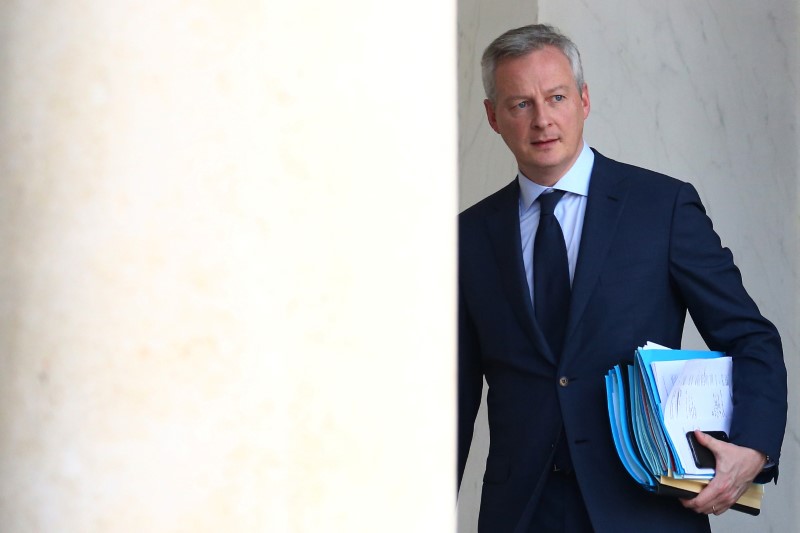 © Reuters. French Finance Minister Bruno Le Maire leaves after the weekly cabinet meeting at the Elysee Palace in Paris
© Reuters. French Finance Minister Bruno Le Maire leaves after the weekly cabinet meeting at the Elysee Palace in ParisBy Leigh Thomas and Myriam Rivet
PARIS (Reuters) – France will cut its budget deficit faster than expected over President Emmanuel Macron’s term as growth proves stronger than previously estimated, the Finance Ministry said on Tuesday.
If the forecasts are borne out by the facts, the improvement means that the 40-year-old leader will be able to deliver France’s first surplus in 48 years at the end of Macron’s term in 2022.
The government is counting on the improved outlook to help rebuild France’s fiscal credibility with its European partners after flouting EU deficit rules for years.
It now expects growth of 2.0 percent this year for the second year in a row before activity starts easing slightly in 2019, it said in an annual long-term budget plans prepared for the European Commission.
It had previously expected growth of 1.7 percent for both 2017 and 2018. As a result, the government now expects a public sector deficit of 2.3 percent of gross domestic product instead of the 2.6 percent forecast in the 2018 budget.
Last year’s better-than-expected growth allowed Paris to hit the 2.6 percent target ahead of time, opening the way for it to exit a disciplinary EU procedure for overshooting a 3 percent ceiling for the previous decade.
“By reducing debt and the deficit, we are respecting our European commitments and recovering our credibility with our European partners,” Finance Minister Bruno Le Maire said in an interview with Le Figaro newspaper.
“It will help us make progress on other major projects like taxing (digital giants) and reforming the euro zone,” he added, referring to two of France’s top European priorities.
Despite the improved outlook for the government’s budget balance, spending was largely unchanged from previous estimates and remains concentrated at the end of Macron’s term.
That leaves finances vulnerable to unexpected changes in the growth outlook and the temptation to ease off spending in 2022 if Macron decides to seek re-election.
Under the updated plans, the lower deficit means that the national debt peaked last year at 97.0 percent and is set to steadily fall to just shy of 90 percent of GDP by the end of Macron’s five year term.
However, Macron’s government is under pressure to take on 46 billion euros ($57 billion) in debt weighing on the SNCF state rail company’s balance sheet.
French government spending, among the highest in the world, is seen steadily falling from more than 55 percent of GDP last year to 51.1 percent by 2022, even less than Macron’s campaign promise of 52 percent.
Meanwhile, France’s considerable tax burden would ease from 45.4 percent of GDP last year to 44.3 percent by 2022, in line with Macron’s campaign pledge for decrease of one percentage point.
Fusion Media or anyone involved with Fusion Media will not accept any liability for loss or damage as a result of reliance on the information including data, quotes, charts and buy/sell signals contained within this website. Please be fully informed regarding the risks and costs associated with trading the financial markets, it is one of the riskiest investment forms possible.
Source: Investing.com




























